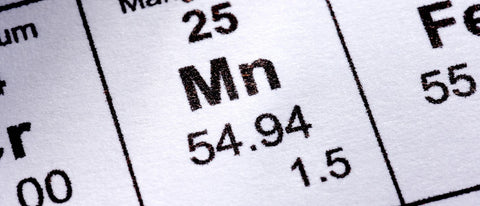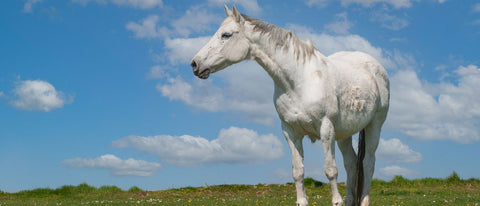
Florian ist aufgewachsen auf einem Bauernhof. Umgeben von Pferden, entdeckte er früh seine Faszination für diese majestätischen Tiere. Inspiriert von seiner reitbegeisterten Mutter, entwickelte er das Nahrungsergänzungmittel - Pferdegold. Seine tiefe Verbundenheit zur Natur und die leidenschaftliche Hingabe zu Pferden trieben ihn an, sein Unternehmen zu gründen.
An often overlooked but essential element in horse nutrition is manganese. This trace element plays a crucial role in the health and well-being of our four-legged friends.
But what exactly does manganese do in your horse’s body?
And why is it so important to make sure your horse gets enough of it?
In this guide, you will learn everything you need to know about manganese for horses and how the element manganese can significantly influence your horse's vitality and performance.

Why is manganese so important for horses?
Manganese isn't just a simple component in your horse's diet. It's a key mineral that plays a role in many processes in your horse's body .
The role of manganese in enzymatic processes
Manganese acts as a silent force in the background, supporting many enzymatic processes in the horse's body. It ensures that all processes can run efficiently and harmoniously.
From energy production to metabolism and immune function – manganese is essential and ensures that your horse feels completely well .
Manganese-rich tissues and their functions
Some tissues in the horse's body are particularly rich in manganese. These tissues, including bones and joints, are crucial for the horse's mobility and strength .
Manganese supports the health of these tissues and ensures that they can optimally perform their functions.
Manganese storage in bones & mitochondria
Bones and mitochondria act as natural stores for manganese . They hold reserves that can ensure the body never runs out of this important mineral.
This storage is involved in maintaining energy metabolism and supporting bone health .
Manganese for horses: The key to a healthy musculoskeletal system
A healthy musculoskeletal system is of central importance for every horse . Manganese contributes to
- joints,
- Tendons and
- muscles
stay in top shape. It supports the formation of connective tissue and can ensure that your horse can move freely and without discomfort.
A sufficient manganese content is important for your horse's general mobility .

Pferdegold® Mineral
Pferdegold Mineral offers a blend of minerals for your horse's daily feeding. A balanced mineral supply supports your horse's general well-being, metabolism, and various bodily functions.
Order nowHow does the element affect the health of horses?
Manganese isn't just a simple component in your horse's diet. It can also actively influence numerous health aspects . The role of manganese in the horse's body is diverse.
Let’s look at this in detail:
Mucous membranes, thyroid & immune system
Your horse's mucous membranes are the first line of defense against external influences and pathogens. Manganese contributes to the function of these mucous membranes, enabling them to optimally fulfill their protective function . Manganese also plays a role in the thyroid gland, which significantly influences your horse's metabolism and energy production . A well-functioning immune system is essential for every horse, and manganese also contributes to this by supporting the body's defenses, which can keep a horse fit and resilient.
How manganese can affect blood sugar levels
A stable blood sugar level is crucial for your horse's energy and well-being . Manganese can help maintain blood sugar levels, as it is involved in glucose metabolism . A balanced blood sugar level ensures that your horse has consistent energy throughout the day and avoids energy slumps.
This can be especially important for sport horses or horses with high performance requirements .

How much manganese does a horse need per day?
It is difficult to give exact information here, as there are different studies with different results, but certain guidelines can be derived, which we have summarized in the table below.
The study results come from a paper by Kentucky Equine Research, Inc. - “Micromineral Requirements in Horses.”
| Source / Study | Manganese requirement per day | Manganese requirement per kg diet (feed) |
| NRC Recommendation 1989 | - | 40 mg/kg |
| Pagan (1998a) | 385 mg | - |
| Hudson et al. (2000) | 540 mg | 60 ppm (equivalent to 60 mg/kg) |
| Combined data | 409 mg | 45 ppm (equivalent to 45 mg/kg) |
Our tip:
It is important to distinguish between the manganese requirement per day and the manganese requirement per kg of diet (feed). While the " manganese requirement per day" indicates the horse's total daily manganese requirement, the manganese requirement per kg of diet refers to the amount of manganese per kilogram of feed that the horse consumes daily.Sources and studies:
-
NRC Recommendation 1989: This recommendation is based on research from other animal species and suggests a manganese requirement of 40 mg/kg diet.
-
Pagan (1998a): This study estimated that the maintenance requirement for manganese in inactive horses weighing 500 – 600 kg is approximately 385 mg/day .
-
Hudson et al. (2000): This study measured manganese retention (i.e., the storage of manganese in the body) in horses receiving various amounts of copper, zinc, and manganese. The calculated maintenance requirement for manganese was 540 mg/day, or 60 ppm of the diet.
- Combined data: By combining the data from the two studies mentioned above, the true manganese digestibility was estimated at 37%, and the maintenance requirement was calculated to be 409 mg/day or 45 ppm of the diet.
Support your horse's manganese supply with Pferdegold® Mineral
Pferdegold® Mineral stands out due to its special composition of natural ingredients and targeted nutrient delivery. Pferdegold Mineral supports the mineralization of horses. Pferdegold Mineral was developed to combat nutritional deficiencies and promote mineralization with targeted nutrient delivery.
Of particular note is the ingredient manganese in the form of protein hydrolysate manganese chelate , which is contained in Pferdegold® Mineral at 3,500 mg per kg . But what does that mean?
Protein hydrolysate manganese chelate is a special form of manganese that can provide better bioavailability in the horse's body . This means that this manganese can be more easily absorbed and utilized by the body .
In addition to manganese, Pferdegold® Mineral also contains other valuable ingredients such as brewer's yeast , which can support digestion, flaxseed , known for its omega-3 fatty acids , and spirulina , a superfood containing a variety of vitamins and minerals . Magnesium, another important ingredient, plays a role in your horse's muscle and nerve function.
The best thing about Pferdegold® Mineral? It's free of processed sugar and grains , making it a particularly well-tolerated choice for your horse. With Pferdegold® Mineral, you're assured of a carefully formulated blend designed to provide your horse with the best possible support at every stage of life.

Pferdegold® Mineral
Pferdegold Mineral offers a blend of minerals for your horse's daily feeding. A balanced mineral supply supports your horse's general well-being, metabolism, and various bodily functions.
Order nowManganese deficiency in your horse: Everything you should know
Inadequate intake or impaired absorption of the mineral A manganese deficiency in your horse can have various reasons, including one.
It is therefore important to regularly check your horse's diet and general well-being in order to detect possible signs of deficiencies at an early stage.

Manganese levels in horse blood count: What they mean
The manganese levels in the blood test can give you an indication of whether your horse is adequately supplied with this important trace element.
An imbalanced manganese level can manifest itself in a variety of symptoms. Therefore, it is advisable to conduct regular blood tests and discuss the results with a veterinarian.
Symptoms of manganese deficiency depending on serum levels
Manganese is an essential trace element for horses. Serum concentrations can provide clues to various conditions. Here are possible symptoms of manganese deficiency in horses, depending on serum levels:
0.5 to 1.0 µg/l:
- Bone, joint and tooth degeneration
- Laminitis
- Equine Cushing's syndrome (ECS)
- Polysaccharide storage myopathy (PSSM)
1.0 to 1.5 µg/l:
- Muscle and joint pain
- Equine Metabolic Syndrome (EMS)
- Extreme reluctance to ride
1.5 to 1.8 µg/l:
- Not yet optimal well-being
- Muscle problems
- Hyperacidity symptoms
- Sensitivity
- Little potential for regeneration (Note: At least 80% of horses are in this range)
1.8 to 3.0 µg/l:
- Optimal for maintaining healthy living conditions
- Sufficient material for the regeneration of connective tissue
3.0 to 4.5 µg/l:
- No negative effects on the organism observed
Source: This information is based on data from Dr. Susanne Weyrauch-Wiegand from 2016.
It's important to note that these values and symptoms are based on empirical observations and may vary from individual to individual. If manganese deficiency or other health problems are suspected in a horse, a veterinarian should always be consulted.
Our product recommendation
Manganese deficiency in horses: symptoms and signs
Manganese is an essential trace element for cartilage formation and thus for joint health in horses. Horses require approximately 40 mg of manganese per kilogram of dry matter (DM) in their diet. Manganese deficiency can lead to health problems, particularly in breeding and growing horses. Research suggests that limb abnormalities in newborn foals, such as enlarged joints and twisted legs, may be associated with a manganese deficiency. As with all minerals, soil pH affects the uptake of manganese by plants.
The most common symptoms of a deficiency in this important trace element include:
-
Skeletal problems: A deficiency can lead to skeletal deformities, slower growth, and an increased susceptibility to bone fractures.
-
Reproductive problems: Fertility may be impaired and lead to reproductive problems.
-
Joint problems: Lack of manganese can lead to joint pain and inflammation, as well as reduced joint mobility.
-
Metabolic disorders: Manganese is involved in energy metabolism and the synthesis of fatty acids and cholesterol. A deficiency can lead to metabolic disorders.
- Weakened immune system: Manganese is necessary for maintaining a healthy immune system.
Please be aware that these symptoms can also be caused by other nutritional or health issues. A precise diagnosis should therefore always be made by a qualified veterinarian . Feeding should be tailored to your horse's individual needs to ensure a balanced supply of all necessary nutrients.
Source: Ohio State University, Ohioline Fact Sheet ANR-6, Mineral Nutrition of Horses .

How important is this trace element for your horse's hoof complex?
Manganese plays a crucial role in your horse's hoof complex . As a trace element, it can contribute to the health and robustness of the hooves. Adequate manganese intake can help keep your horse's hooves in good condition. It is therefore important to ensure a balanced diet.
That is why manganese is relevant in allergic reactions
Manganese can play a role in supporting your horse's immune system . During allergic reactions, the immune system is often overactive, and a balanced supply of trace elements like manganese can help maintain balance. However, it's important to always consult a veterinarian regarding health concerns or specific nutritional requirements.
Excess manganese: A cause for concern?
An excess of manganese in horses can cause health problems. Horses typically need about 400 mg of manganese per day for maintenance and about 500 mg for moderate exercise .
Excessive manganese in the diet can impair phosphorus absorption. It's important to find the right balance, as both a manganese overdose and a deficiency can be problematic. If you have any concerns, always consult a veterinarian.
Source: Stance Knowledge

Pferdegold® Mineral
Pferdegold Mineral offers a blend of minerals for your horse's daily feeding. A balanced mineral supply supports your horse's general well-being, metabolism, and various bodily functions.
Order now

Conclusion
Manganese isn't just a detail in horse nutrition; it's a crucial building block. This trace element supports numerous bodily functions and helps ensure your horse is optimally nourished throughout every phase of life. At Pferdegold, we are passionately committed to combating nutritional deficiencies and supporting your horse's nutrition with targeted nutrient intake. With Pferdegold, you choose natural quality and tailored care for your four-legged friend.
FAQ
How does manganese affect horse fertility?
Manganese may play a role in the reproductive function of horses. It is believed to support fertility and contribute to the normal development of reproductive organs. However, it is important to always consult a veterinarian regarding specific fertility issues.
Do foals need more manganese than adult horses?
Foals have special nutritional needs during their growth phase. They may have an increased need for certain nutrients, including manganese, to support healthy bone and tissue development.
Which other minerals and vitamins influence manganese absorption?
Manganese absorption can be affected by other minerals and vitamins. For example, high levels of calcium or phosphorus can inhibit manganese absorption. It's important to consider your horse's overall nutritional profile to ensure it receives a balanced intake of all the nutrients it needs.

















